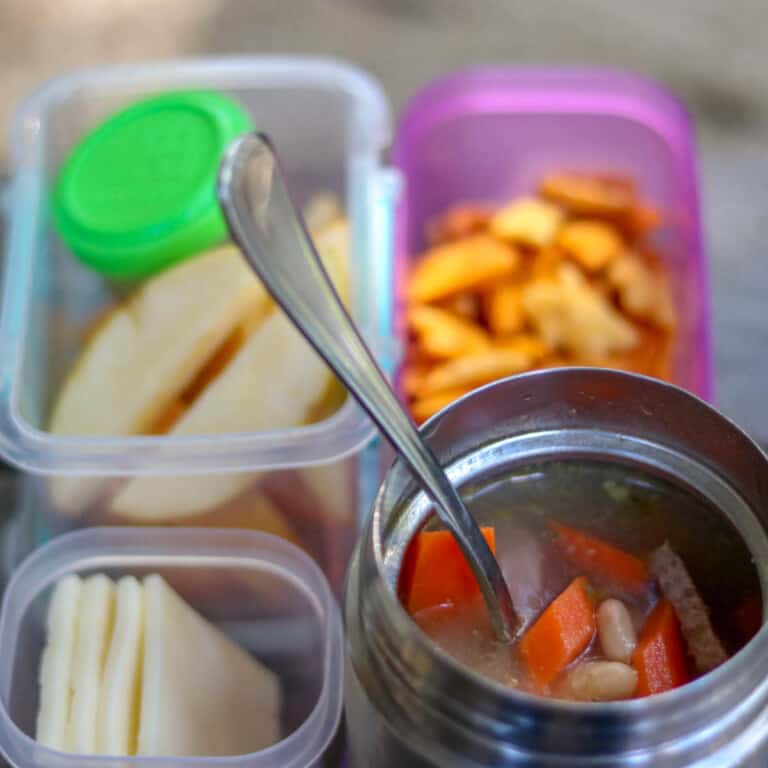A few months ago, when my 4th graders’ nutrition unit was approaching, I offered to do a lesson for the class. At that time, I had no idea it would need to be virtual, but I was still excited to teach his class a developmentally appropriate nutrition lesson.
I created a virtual lesson and wanted to share it with you, in case you want to use it with your upper elementary-aged child. The lesson is about the “Edible Parts of the Plants.” The video is below along with 2 handouts to go with it.
Developmentally Appropriate Nutrition Education
What makes this lesson developmentally appropriate? It teaches children concrete information about food and doesn’t include moralistic views of food. The lesson encourages the students to learn more about the foods they eat and think about where the foods come from.
My 4th grader asked me to add the first 3 tips, because he wanted his classmates to hear what I tell him at home. If I was doing this lesson in person, I’d also include a no-pressure taste test.
Please feel free to use and share. And let us know what edible parts of plants you like!
Love this post and want to save it for later?
Just fill in your email address below, click “Save It” and get it delivered right to your inbox.
Developmentally Inappropriate Nutrition Education
Update: Brain Pop removed the quiz question mentioned in this post after we contacted them and expressed our concern. They also agreed to change a troubling lesson on sugar that contained weight bias.
Over the last 2 months of the COVID-19 stay-at-home orders, like many of you, I have been home more with my children and helping them with their virtual learning. I have a 7th grader and a 4th grader, who both over the last several weeks have had school lessons about nutrition and health.
Over the years, I’ve had some exposure to their nutrition lessons, but I’ve had a much closer look these last couple of months. It’s highlighted for me how much work we have to do regarding how we teach our children nutrition.
Over the last 20 years, how and what we teach children about food has become more weight focused and developmentally inappropriate. Instead of teaching children where food comes, exposing them to new foods, and teaching them to care for and respect their bodies, we teach fear and mistrust. The examples of this are endless, but a few were literally in my home recently.
We need to stop teaching children that appearance indicates health.
A couple of weeks ago, my 7th grader was learning about hypertension and took a quiz on “Brain Pop,” a teaching platform commonly used in US schools. She called me into her room to view the question, because she knew how offensive it was.
The question read: “Which of the following people are least likely to have hypertension.” There were then 4 cartoon images:
- A. A woman of color, with yellow teeth, smoking a cigarette
- B. A man in a large body
- C. A thin man, with gray hair
- D. A man in a baseball hat, with a baseball bat

The quiz question was upsetting on so many levels and reinforces stereotypes and stigma. My daughter immediately pointed out to me how terrible it was to portray a person of color in this way and the stereotypes it was perpetuating.
Furthermore, the question asks the student to make a judgment based on a cartoon picture and then equate it to a health marker you cannot see. We are literally teaching children to judge people by how they look.
A 2008 study looked at if BMI was an accurate indicator of metabolic health. In the study, the researchers defined metabolic health by blood pressure, cholesterol, insulin resistance, and inflammation indicators.
The study found that using BMI as an indicator of metabolic health, misdiagnosed 23.5% of “normal” weight people as healthy, misdiagnosed 51.3% of “overweight” people as unhealthy and misdiagnosed 31.7% of “obese” people as unhealthy (doi: 10.1001/archinte.168.15.1617).
If we know this, why are we teaching children to judge someone’s health by looking at a cartoon portrayal of a human? What we know is that health doesn’t look a certain way, and stigma and prejudice of all kinds leads to worse health outcomes.
We need to stop teaching children to fear foods.
During the same unit, my daughter was told to avoid frozen foods, because they cause hypertension. The same week, Elizabeth posted a blog post about different ways to cook frozen vegetables. My daughter read this to me and then looked wide eyes and said, “Frozen food”?
We often have frozen food, and even more now during the pandemic. My daughter recently has started making smoothies out of frozen berries as a snack and is so proud of herself when she does this.
If you’re thinking, “but that’s not what they meant,” you and I can understand these abstract intricacies, but children cannot. Nutrition is not black and white, and when we teach children nutrition in a fear-based, absolute way, we create more fear and confusion.

We need to stop teaching children to fear weight gain.
Another example of an age-inappropriate nutrition lesson was from my 4th grader. Last week, he watched a Brain Pop video that said he should exercise to maintain his weight. We don’t want 4th graders to maintain their weight.
If a child is not gaining weight it is a sign that something could be medically wrong. More importantly, we want children to love and enjoy body movement to the best of their ability to keep their minds and bodies strong.

More Resources for Nutrition Education
My friend and colleague Katherine Zavodni and I created a nutrition curriculum for preschool and elementary-aged children as an alternative to the weight-focused curriculum and lessons. This curriculum aims to use developmental theory to inform what and how we teach children about nutrition. We will keep you updated.
Other Resources We Love:
- Don’t Teach My Kids to Diet, 5 Resources to Give Teachers and Schools, Sunny Side Up Nutrition
- Help! My Kid has been sent home with a serve of diet culture, The Mindful Dietitian
- Let’s Make Our Classrooms and Schools Free of Diet Talk, Sunny Side Up Nutrition
- Healthy Bodies, Middle School Curriculum, Kathy Kater

We’re Elizabeth & Anna!
It’s great to have you here. We’re registered dietitians and we share tips to support you in raising kids with a healthy relationship with food.






You mentioned you are working on a curriculum for elementary aged children. Have you developed that curriculum? This article is from 2020 so I thought there might be a chance. I am wanting to teach a nutrition class to a homeschool group of elementary schoolers and everything you have said is exactly what I want. I am finding it hard to find a curriculum that does exactly this. If not, do you know of any other curriculums that are good?
Hi Melanie – I will email you with details about our curriculum. It will be available soon. Please check your email for more information.
Please do a follow up about brain pop and let us know! Kudos to your daughter! Way to go!! These subtle and not so subtle messages are all around us . Brain Pop may appreciate your input and will hopefully become more aware and correct. If it were me I would use this as a teaching tool for the 7th grade class.
Empowering newsletter, thank you!!
Hi Nan, Thank you for reading. Exciting news! Brain Pop agreed the question needed to change and followed through with changing it!
YES!! So excited to see Brain Pop changed the question. Thank you 🙂
Yes! Thank you!
Thanks for posting this video. This is actually a great lesson for 3rd graders as they learn about the plant parts in their science curriculum in NC.
HI Kayla, Thanks very much for watching the video!
This is super weird. I would love to post when you have identified the right person at Brain Pop to contact. It wasn’t hard to find the CEO’s name, but I didn’t send a message since I know you are investigating. Will wait to hear. Jessica
HI Jessica,
Anna will reach out to you soon!